Do you want to perform a WordPress page speed test on your website? Are you wondering about how to test WordPress site speed? Well, you’ve arrived at the right place.
The website’s speed should always be a significant concern as it improves user experience as well as affects your ranking in the search engines. You might’ve also come across various tools to test your WordPress site speed.
Although there are many WordPress page speed test tools, we’ve mentioned the top 6 reliable and free tools. Also, we’ve mentioned some fantastic tips to increase your WordPress website’s speed.
So, let’s learn why speed is essential for the WordPress site before learning how to check WordPress website speed.
Why is it Important to Speed Up Your WordPress Site?
In this era of everything getting faster, nobody wants to waste their time on a slow-loading website, even for a few seconds. When it comes to the users, the speed of your WordPress site gives an excellent first impression.
A report from Google shows that 53% of visitors leave the webpage if it doesn’t load in under three seconds. This data is for visitors using mobile devices. So, if your site’s speed is slow, there is a high chance of people never returning to your website.

Then again, when it comes to search engines like Google, speed is also one of the vital signals for ranking your website. Hence, the search engines also prioritize a fast-loading website.
Besides, it would be great if you also considered the page speed of your website to provide a good user experience and decrease the bounce rate of your website. In a nutshell, if you want more visitors to your website, you must speed up your WordPress website.
How to Test WordPress Site Speed?
You might find it unnecessary to check your WordPress site just because it is fast from your experience. But what happens behind the scene is, when you frequently visit the site, your browser stores the website’s cache and fetches the website fast; this makes you feel like your website is fast.
However, the new visitors do not experience the same thing. Hence, you need to do your WordPress site speed test.
Well, if you thought of buying some tools for performing a WordPress site speed test, drop that idea right now. For your information, there are many free, reputed, and reliable tools for testing your website speed.
Using those free tools, you can conduct the WordPress performance test simply by entering the URL of your website. And these tools provide you with more than enough data about your WordPress page speed when you perform the test.
Those tools allow you to analyze the time your website requires to load from different locations, total load times, determine whether the images need to be compressed, and many other essential reports.
So, let’s find out the best free WordPress site speed test tools and how to check WordPress website speed using those tools.
6 Best Free Tools to Test WordPress Site Speed
1. Google PageSpeed Insights
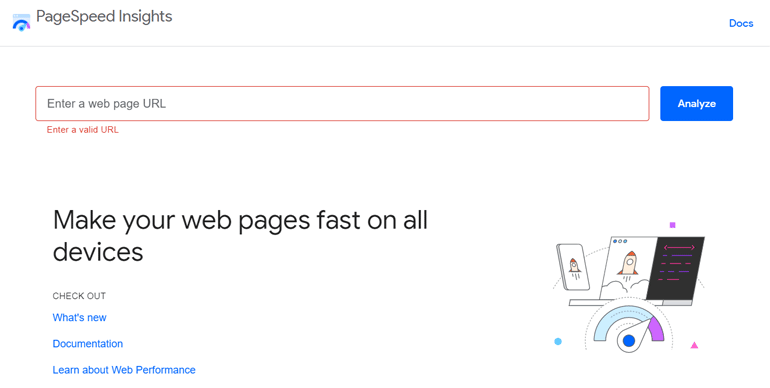
Google PageSpeed Insights is the most reputed free tool for performing the WordPress site speed test from Google. It analyzes the website when you provide the URL of the respective site and gives the result for performance based on both mobile devices and desktops.
Besides, the data helps you learn about your real user experience worldwide. Some of the metrics it depends on to show the performance data include First Contentful Paint (FCP), First Input Delay (FID), Largest Contentful Paint (LCP), etc.
Further, it also provides data helpful in debugging the issues regarding performance under the section of opportunities. Along with the room for improvements, you’ll also see the estimated time you can save on doing so.
The report that you get from PageSpeed Insights is beneficial because the majority of the people use Google as their search engine. Thus, there is no doubt that you can improve the ranking on Google’s search result page by following the suggestion of PageSpeed Insights.
Key Features of Google PageSpeed Insights:
- Provides both lab and field data for the page
- Collects experience from the past 28 days
- Uses lighthouse to analyze the URL
- Classifies user experience as Good, Needs Improvement, or Poor
2. GTmetrix

GTmetrix is another best free tool for carrying out the WordPress site speed test. It’s a reliable tool as it provides detailed reports. Further, the tool offers grading as per your site’s performance report. In the same way, you can sign up for a free account and discover various options for WordPress performance tests.
GTmetrix focuses on those aspects that matter the most for your visitor. Using the tool, you can track the WordPress page speed by scheduling the test and monitoring through interactive graphs. Further, it lets you set a notification when the page performs poorly.
Interestingly, the tool lets you analyze WordPress performance from 67 servers in 22 different world locations. Meanwhile, it allows you to test your page on Simulated Device or an actual Android device and give real-world data.
Key Features of GTmetrix:
- Allows to set alerts with numerous conditions
- URL filtering to block or allow specific resource
- Simulate performance on more than 20 different mobile devices
- Option to disable ads on the webpage to see the performance difference in loading
3. Pingdom

Pingdom is one of the reputed tools for conducting the WordPress site speed test using the seven available options for server location. It allows you to choose from more than 70 global locations to test WordPress performance. Similarly, it’s highly recommended to those who want to get instant notification when something goes wrong on their website.
After conducting a speed test, the tool provides the grades out of 100 to the WordPress site. One of the fantastic features of the tool is that it gives the percentile of the site when analyzing the performance compared to all the websites tested using this tool.
The test result shows the file sizes, the load time of the website, and every other detail of the web page. It also identifies which website content slows down your site and recommends improvements.
Key Features of Pingdom:
- Uptime monitoring
- Transaction monitoring
- Provides data of actual site visitors
- Effective alerting when you need to be the first to know
4. WebPageTest
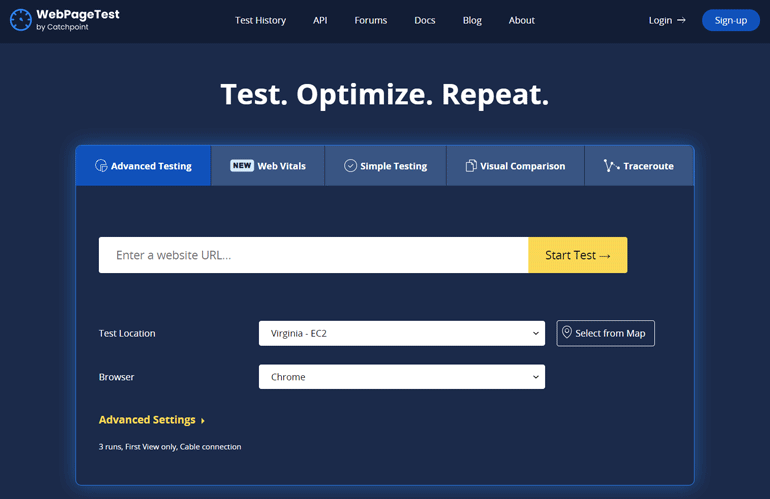
WebPageTest is a fantastic tool for performing the WordPress page speed test. It runs the WordPress performance test three times and generates each test report. Here, the reports are presented on waterfall view, and also, the screenshot and a slow-motion video of the page loading process are available.
Additionally, it gives the filmstrip view of the page. The filmstrip of the webpage it generates provides you with a visual of how long the page remains blank while loading or how long it takes for the page to render the important content of the webpage.
Other elements of the test report include details, web vitals, performance, content, image analysis, and so on. Also, the content breakdown provides two pie charts for representing requests from the element and the bytes they require.
Key Features of WebPageTest:
- Advanced testing with scripting
- Provides test history for up to 30 days
- Exportable and powerful visualization reports
- Enables a wide variety of custom-defined metrics
5. Uptrends
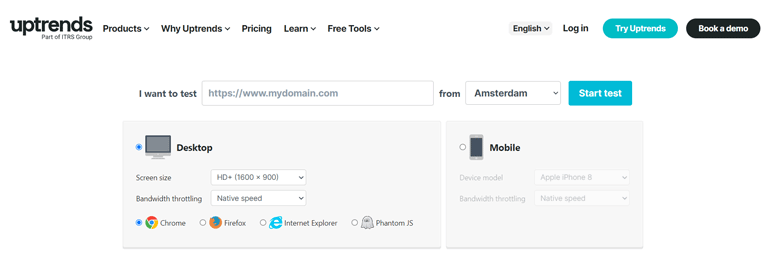
Uptrends is a user-friendly tool used for the WordPress performance test. Similar to Google PageSpeed Insight, it also provides the performance reports of your site on both mobile and desktop. Further, it allows you to conduct WordPress site speed tests on different browsers like Chrome, Firefox, and Phantom JS.
Some of the general information or the results that the tool shows are Google page speed score, load time, size, requests, and so on. It also provides suggestions for improvements and their impacts as high, medium, and low. Besides, you can also see the number of response codes on your website.
Furthermore, you can also see the important loading events with W3C navigation or Google’s core web vitals. Meanwhile, you can catch the third-party content providers who are slowing down your website.
Key Features of Uptrends:
- Provides Interactive charts
- Custom dashboard available with metrics your need
- Gives visual confirmation of downtime caused by errors
- Supports various protocols like HTTP/HTTPS, SMTP, FTP, etc.
6. KeyCDN Website Speed Test
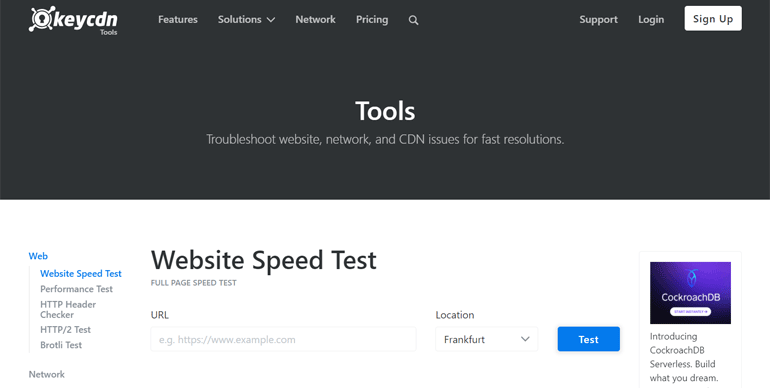
KeyCDN’s Website Speed Test is an incredible tool for executing the WordPress site speed test. It provides performance grades for the website’s overall score as well as for the individual aspects. Likewise, the test can be performed from 10 different locations worldwide.
The testing results provide a complete breakdown of the request, loading time, HTTP status codes like 200, 404, and content size. Additionally, the waterfall reports deliver the details of specific asset timing and HTTP headers.
Using the tool, you can also carry out other tests individually, such as performance tests, HTTP header checker, HTTP/2 tests, and Brotli tests.
Key Features of KeyCDN Website Speed Test:
- Supports IPv6
- CDN service available
- Handles small to large website
- Has a wide range of settings
Some Tips to Speed Up Your WordPress Site
1) Choose a Fast Web Hosting
A web hosting company has a significant impact on the speed of your website. When the hosting company doesn’t have enough resources on the server, the website slows down.
Therefore, no matter how many improvements you make to your website to speed it up if you have sluggish hosting, the site remains sluggish. Hence, it would be best to choose a web hosting with at least 99.5% uptime such as Bluehost.

At the same time, depending upon your website, you can choose to host from various available options such as shared hosting, VPS (Virtual Private Server) hosting, dedicated hosting, cloud hosting, and many more.
2) Use WordPress Theme with Optimized Speed
The WordPress theme you use in your website provides excellent layouts and design. But if your theme is not optimized for speed, the good looks of your website provide value for nothing as it slows down your site’s speed.
A good WordPress theme is constantly optimized for speed. Hereafter, opt for the speed-optimized WordPress theme to improve the site’s speed. Themes like Zakra, ColorMag, and Spacious are optimized for speed. They are also well tested with the tools mentioned above.

3) Use WordPress Caching Plugins
A WordPress caching plugin is responsible for saving the website’s pages when the user visits them for the first time. It then loads the web page faster when the same user visits the page the next time.
The plugin reduces the load time as it serves the users with the cached version of your website. Also, it minimizes the database request significantly.
There are some popular WordPress caching plugins that you can use in your WordPress site to reduce the site’s loading time significantly. Some of them are WP Rocket, W3 Total Cache, Autoptimize, etc.

4) Optimize Images
You might have loved the thought of using high-resolution images on your website to make it look beautiful. Or you have also been practicing the same thing on your website. But the high-resolution images have a large file size which ultimately affects the loading time. At the same time, the site’s load time also depends on the image format.
The most common file types used on the web are PNG and JPEG, but recently WordPress also started supporting WebP format for the images. Although the images in these formats are similar in size and smaller, WebP format is better for using in the website. Besides, you should also always compress the images before using them on the web.
5) Update Core WordPress regularly
WordPress regularly brings the update that comes with improved performance, some fixes for bugs, updates for security, newly added features, and so on. Each new release tries to make the website run faster and more efficiently.
Therefore, when you don’t update your core WordPress, your site is prone to security attacks and misses the new improvements. As a result of this, your site slows down.
You can simply check for the new version from the Updates in the Dashboard. So, hurry up and update your core WordPress if you haven’t.
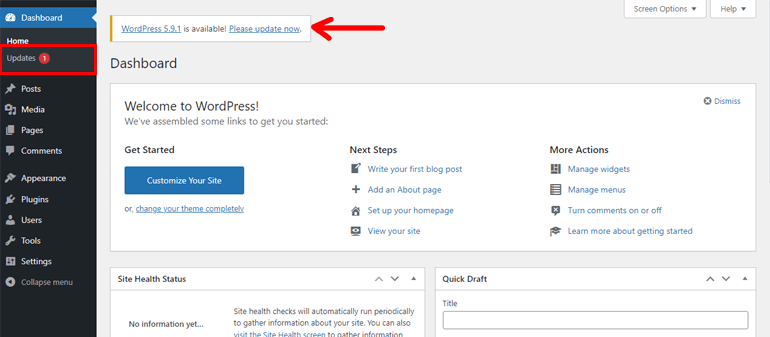
Wrapping It Up!
That was it from our side on how to test WordPress site speed. We’re hopeful that you now know how to check WordPress website speed using any of the above-mentioned free tools.
Therefore, perform the WordPress page speed test of your website frequently. Also, use the tips we’ve provided to improve WordPress site performance; it might do wonders for you.
Before you leave, check out our article on how to change the font in WordPress. You can also share the article using the social button below.
And yes, connect with us on Twitter and Facebook to get notified of every new article.



